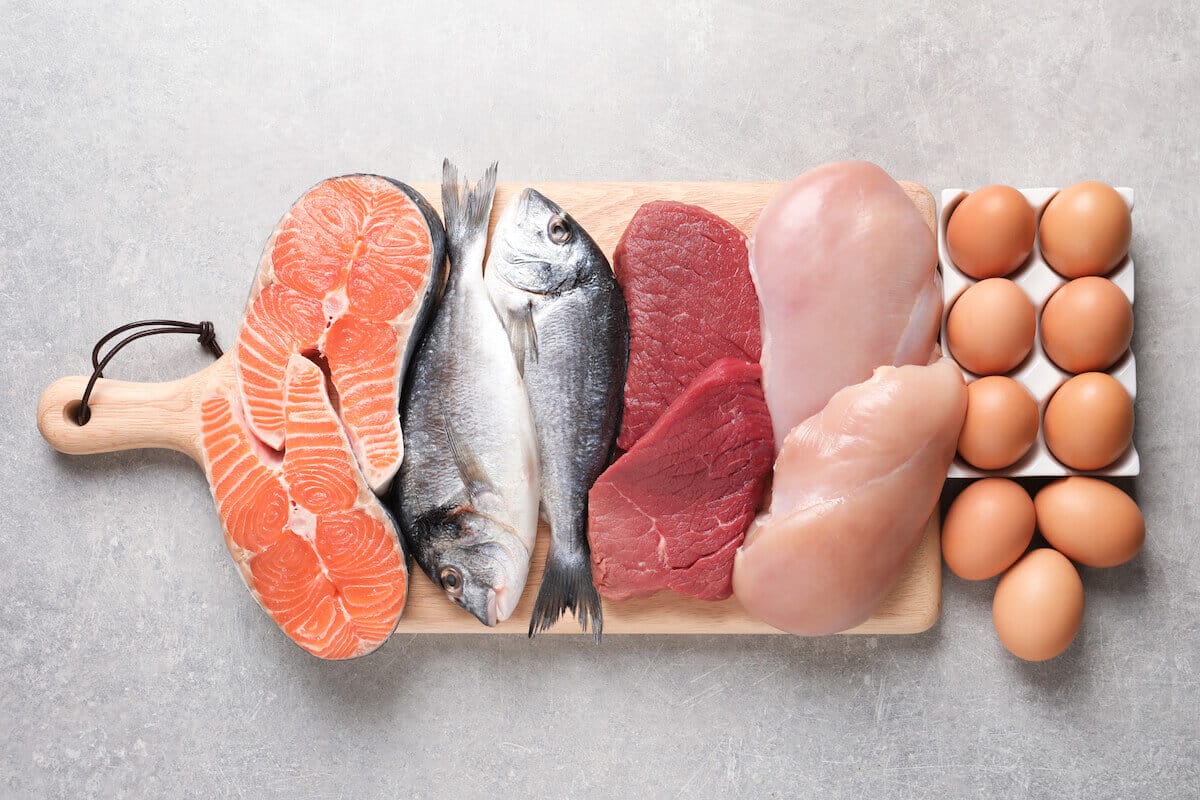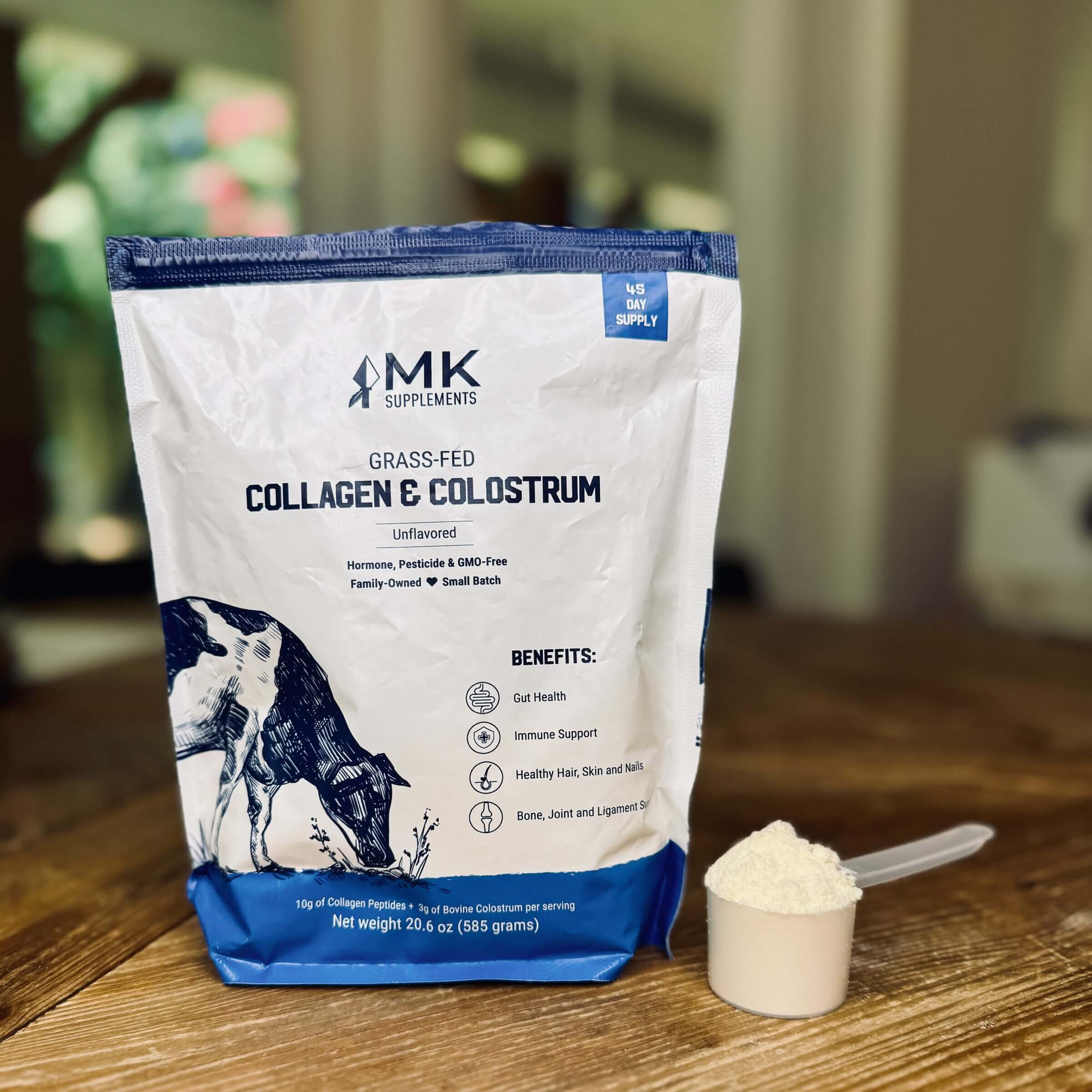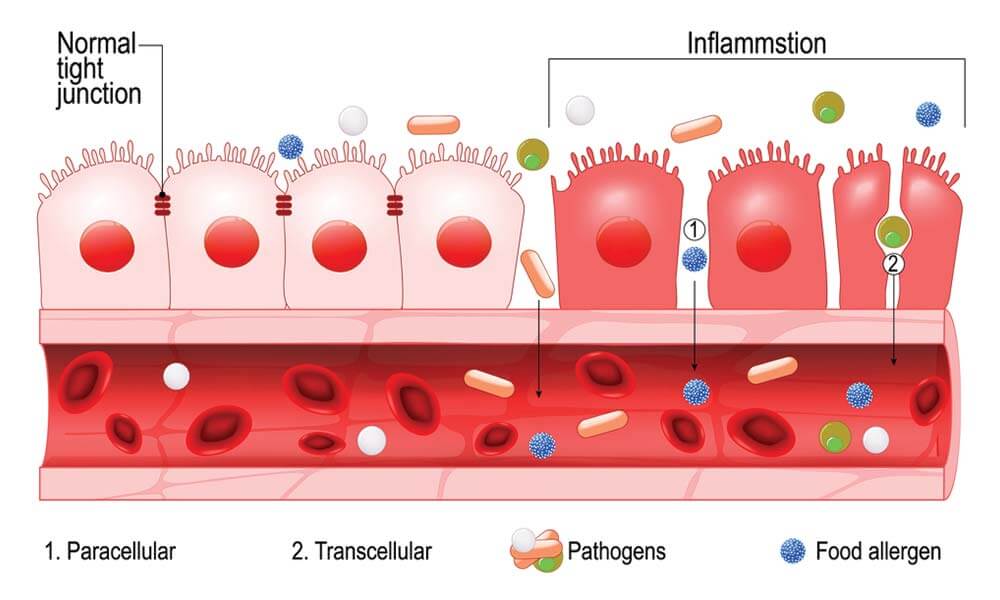Many health-conscious people add collagen supplements to their diet hoping to improve skin health, relieve joint pain, prevent bone loss, boost muscle mass, promote heart health, support gut health and more.
This article gives a brief overview of both how collagen works and its health benefits, with the goal of helping you decide whether collagen supplementation makes sense in your specific situation.
Before we dive into the scientifically-proven health benefits, let’s go over the basics.
What Are Collagen Peptides?

Collagen is the most abundant type of protein in your body and, in particular, in your connective tissue (such as joints, ligaments, tendons and muscles).
Think of collagen as a building block for tissue. Without it, the body cannot build new tissue or repair damaged tissue.
Types of Collagen Protein
Based on the current scientific research, there are at least 28 types of collagen. Most supplements contain one or more of the following collagen types:
- Type I: 90% of the collagen in your body is Type I, which is used to provide structure to connective tissue, skin, tendons, etc.
- Type II: Used for elastic cartilage to cushion joints.
- Type III: Supports the structure of muscles, blood vessels and organs.
- Type IV: Main component of the basement membrane in your skin. It acts as a barrier between tissue compartments.
- Type V: Similar to Type IV, type V collagen is a fibrillar collagen that’s found between the dermal and epidermal layers of the skin and placental tissue.
- Type X: Found in specialized cells (hypertrophic chondrocytes) that are responsible for bone growth.
Some collagen powders contain hydrolyzed collagen peptides, which the body can rearrange into any of the 28 known collagen types. These products are likely more effective than regular collagen powders (which may only have one or two different collagen types), or even multi-collagen supplements.
How the Body Makes Collagen From Protein

The human body requires collagen, which it produces by breaking down protein from food into amino acids. Those amino acids are then converted into peptides (larger chains of different amino acids).

If you eat enough protein, you will probably get all the collagen you need as a result of this natural process. However, a lack of dietary protein can result in a lack of collagen, thus reducing the body’s ability to function optimally.
Additionally, the body’s ability to produce collagen declines with age, beginning at around age 30. So as you get older, you may need to increase your level of protein consumption or rely on collagen supplementation.
Note that many plants also contain protein, but they’re generally less absorbable and bioavailable than proteins from animal-based sources. Additionally, no single plant contains all the essential amino acids found in animal-based protein sources.
At the same time, collagen supplementation can be beneficial regardless of your age (and especially if you consume a plant-based or low-protein diet).
That’s because, when given a limited supply of protein, your body will use the protein it receives for critical functions like repairing muscle tissue, and will neglect “less important” tasks like nail growth and skin maintenance.
So with all that in mind, the big question is this: if you already consume adequate amounts of protein through your diet, does supplementing with collagen powder offer any additional health benefits?
The short answer is “maybe.”
Let’s dive into the details so you can figure out if using a collagen supplement makes sense for you.
9 Purported Health Benefits of Collagen Supplements

Collagen supplement brands claim their products offer numerous health benefits, mostly in the popular area of anti-aging. Some brands even claim that one scoop of their collagen powder can fight signs of aging by increasing skin elasticity and hydration, supporting cell regeneration, and increasing the tone and firmness of your skin.
So let’s take a look at the scientific evidence behind some of the most common health claims made by collagen powder manufacturers.
1. Improves Skin Health

Considering that collagen is an important factor in maintaining healthy skin tissue, it seems reasonable to assume that providing the body with ample amounts of collagen protein would be beneficial.
Indeed, a systematic review of 11 studies with a total of 805 patients showed that supplementing daily with collagen improved skin elasticity and hydration — two important aspects of anti-aging and wound healing.
However, it’s worth noting that the studies didn’t reveal how much and what types of dietary protein the participants consumed. In other words, it’s possible that someone who consumes adequate amounts of high-quality protein (from animal sources) might see fewer benefits from supplementation.
I should also mention that many skin conditions, including eczema and acne, are likely caused by inflammation in response to dietary factors (such as antinutrients in plants) and environmental toxins (such as those found in skincare products) — not a lack of collagen.
If you suffer from chronic skin issues, I recommend removing most plants from your diet and taking steps to reduce your systematic inflammation. You can also try supplementing with collagen, but don’t overlook the potential inflammatory roots of your condition.
If slowing down aging is your primary concern, here’s what you should do before considering a collagen supplement:
- Stop eating processed carbs (especially sugars) and vegetable oils. Many processed carbs and seed oils cause insulin resistance and inflammation, and they can damage collagen.
- Stop smoking. Smoking causes inflammation and cell damage (among other things).
- Expose your skin to sunlight regularly and responsibly. While too little sun exposure is bad for your health, too much UV light can damage your skin and speed up its aging process. The latter is mostly true when combined with an increased intake of inflammatory omega-6 fatty acids.
- Start intermittent fasting, as this is where the real cell regeneration (which is called autophagy) happens.
2. Improves Hair and Nail Growth

Despite the fact that both my wife and I consume large amounts of protein as part of our animal-based diet, we’ve both experienced dramatic changes in our hair and nail growth while supplementing with hydrolyzed collagen peptides.
In other words, the more collagen we consume, the more often we have to cut our hair and nails.
Of course, this is anecdotal evidence. But this clinical trial concluded that the daily use of specific bioactive collagen peptides improves nail growth and reduces symptoms of brittle nails.
My take is that supplementing with collagen can improve hair and nail growth, especially when combined with a proper diet. That’s because tissue growth and repair (including nails and hair) also relies on nutrients besides collagen peptides (i.e., vitamins and minerals like biotin).
For example, my mother called me the other day to tell me that she has experienced significantly less hair loss and split nails since she started supplementing with my freeze-dried beef liver supplement. I hypothesize that this is because of the highly-bioavailable micronutrients (including biotin) found in liver.
The bottom line is that if you suffer from issues related to your hair or nails and supplementing with collagen doesn’t make a significant difference, you might be lacking other essential nutrients.
3. Relieves Joint Pain

Unless caused by an injury, chronic joint pain is usually the result of inflammation, triggered by lifestyle choices such as diet, tobacco use and other factors.
Based on the scientific evidence I’ve seen, supplementing with 10 grams of collagen per day can help relieve the symptoms of common joint issues, including osteoarthritis, but it doesn’t cure the problem.
In other words, you have to make the appropriate lifestyle changes to address the causes of the inflammation in order to permanently relieve joint pain. Supplementing with collagen in parallel is a great way to treat your symptoms, but it can’t be viewed as a replacement for making essential lifestyle changes.
4. Prevents Bone Loss

Collagen and calcium are the main building blocks of bones, and low levels of either nutrient can lead to reduced bone mass and osteoporosis. As a result, it’s important to consume ample amounts of protein and calcium.
A systematic review concluded that, “collagen hydrolysate has a positive therapeutic role in osteoporosis and osteoarthritis: potentially increasing bone mineral density, having a protective effect on articular cartilage and, primarily, providing symptomatic relief of pain.”
In other words, supplementing with collagen can mitigate bone loss. But it’s important to understand that there are several factors involved in how the body remineralizes bone tissue.
For example, vitamin K2 is an important player that helps get calcium into bones and teeth by activating calcium-binding proteins.
To ensure that my body gets all the micronutrients it needs to keep my bones (and other organs) healthy, I consume beef liver on a daily basis because it’s loaded with over 25 vitamins and minerals (including Vitamin K2) in the most bioavailable forms.
You can learn more about beef liver’s benefits in my article on why you should eat organ meat.
5. Boosts Muscle Mass

Protein is the building block of muscle tissue. If you don’t get a sufficient amount of high-quality protein from the food you eat, you won’t be able to increase your muscle mass.
Most people can get enough protein from whole food sources. But if you’re a professional strength athlete with increased protein demands, you might benefit from liquid sources of protein, such as shakes made with collagen powder.
However, it’s worth noting that collagen is low in certain amino acids, such as leucine, that are essential for building lean muscle tissue. In other words, regular protein powder is usually more effective for boosting muscle mass than collagen powder.
I usually add one scoop of MK Supplements Collagen & Colostrum (hydrolyzed collagen powder) and one scoop of a high quality protein powder into 16 ounces of raw milk or kefir after an intense workout. That way, I get the best of both worlds and increase muscle protein synthesis.
6. Promotes Heart Health
The body needs collagen in order to maintain healthy blood vessels. If you don’t have enough collagen, your arteries may narrow and become less flexible and elastic, leading to cardiovascular issues like a stroke.
In a clinical trial from 2017 involving 32 healthy individuals, participants were given 16 grams of a collagen tripeptide for six months to evaluate the effects of collagen on the development of atherosclerosis. The study’s authors concluded that collagen tripeptide administration resulted in significant improvements in several predictors of atherosclerosis.
However, it’s worth noting that we don’t know anything about the lifestyle choices of the study participants. They could have been following something akin to the standard American diet (SAD) or even plant-based diets that are low in bioavailable protein.
In other words, I have not seen any evidence suggesting that supplementing with collagen improves heart health if you’re already following an animal-based diet that’s high in protein.
7. Supports Gut Health

There are several functional medicine practitioners, such as Dr. Taz, who claim that oral supplementation with collagen can help fix a leaky gut.
It’s true that glutamine (one of the amino acids found in collagen) plays an important role in maintaining a healthy gut and protecting the integrity of the mucosal lining in the gut.
However, in addition to leveraging collagen (and colostrum) to help heal the gut, it’s vital to address the root causes of leaky gut, including plant-based and environmental toxins, processed foods and stress. Without removing the triggers, you’ll never fully heal.
8. Improves Mood and Reduces Anxiety

Some collagen powder manufacturers claim their products can improve mood and reduce the symptoms of anxiety because collagen is a good source of glycine, an amino acid that’s involved in the creation of serotonin (a neurotransmitter that regulates mood).
Unfortunately, there aren’t many studies that show how supplementing with glycine (or products that contain glycine) impacts serotonin levels in humans. However, a 2011 study on rats showed that supplementing with 1-2 grams of glycine per kilogram of bodyweight increased extracellular serotonin levels for 10 minutes.
I weigh over 90 kilograms and I’d have to supplement with 90-180 grams of glycine to get a 10 minute spike in serotonin. That’s significantly more than what you’d find in a scoop of collagen powder.
In other words, there are probably more effective ways to improve your mood and reduce anxiety, such as infrared sauna bathing, cold plunging and meditation.
9. Speeds Up Weight Loss

Some people say that supplementing with collagen can promote weight loss, but I’m skeptical of that claim.
Losing weight is a byproduct of a healthy lifestyle that includes an appropriate diet, high-quality sleep and proper stress management — along with all the other things I discuss in my healthy lifestyle guide.
Adding a scoop of collagen per day into your diet won’t address, and doesn’t outweigh, those factors.
However, I’d argue that replacing carbohydrates with protein and fat can speed up weight loss, and you can certainly make a high-quality collagen supplement a part of that dietary strategy.
What Foods Are Naturally High in Collagen?
If your goal is to increase your collagen intake from real food rather than supplements, I recommend drinking bone broth and eating seafood.
Chicken and egg whites are also good sources of collagen, but the former is usually high in unfavorable polyunsaturated fatty acids (i.e., omega-6) and the latter contains certain proteins (e.g., avidin) that can inhibit nutrient absorption (especially when not fully cooked).
Besides eating enough animal protein to fuel your body with the ingredients it needs to make collagen, you should also stay away from sugar and processed carbs. Those cause inflammation and can damage collagen.
Also, there are certain vitamins, such as Vitamin C, that are important for your body to maintain proper collagen levels. However, it’s important to understand that the human body is a complex piece of machinery and Vitamin C isn’t the only component needed to make collagen. That’s why I recommend against supplementing with synthetic vitamins.
Instead, you should aim to obtain most of the micronutrients your body needs from whole food sources, including organ meats. For example, beef spleen is an excellent source of highly-bioavailable Vitamin C!
If you can’t stomach the taste of organs, you should consider freeze-dried organ meat supplements.
Wrap-Up: Collagen Powder Benefits
As you grow older, collagen production decreases, which is why it’s important to consume sufficient amounts of protein to maintain optimal muscle, skin and joint health.
But it can also be helpful when you’re young. Collagen peptide supplementation is an easy and convenient way to fill potential gaps in your diet (such as when you’re traveling) or when your body’s demands are greater than what you can easily supply via your regular diet (like in the case of competitive athletes).
What’s great about collagen supplements is that they have virtually no side effects as long as you pick a high-quality product that doesn’t contain artificial or highly-processed ingredients.

Michael Kummer is a healthy living enthusiast and CrossFit athlete whose goal is to help people achieve optimal health by bridging the gap between ancestral living and the demands of modern society.
Medical Disclaimer
The information shared on this blog is for educational purposes only, is not a substitute for the advice of medical doctors or registered dieticians (which we are not) and should not be used to prevent, diagnose, or treat any condition. Consult with a physician before starting a fitness regimen, adding supplements to your diet, or making other changes that may affect your medications, treatment plan or overall health. MichaelKummer.com and its owner MK Media Group, LLC are not liable for how you use and implement the information shared here, which is based on the opinions of the authors formed after engaging in personal use and research. We recommend products, services, or programs and are sometimes compensated for doing so as affiliates. Please read our Terms and Conditions for further information, including our privacy policy.
